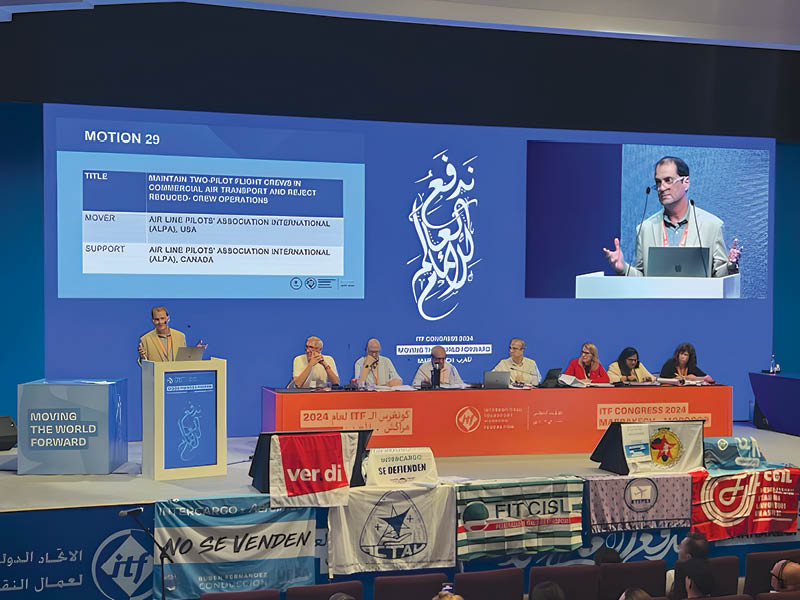ALPA Leads Fight Against Reduced-Crew Operations at ITF Congress
International Transport Workers Overwhelmingly Oppose Removing Pilots From the Flight Deck
By Gavin Francis, Senior Aviation Writer

Capt. Jason Ambrosi, ALPA’s president, standing, introduces a motion during the International Transport Workers’ Federation Congress in Morocco calling for coordinated global action against the push by some manufacturers and regulators for single-pilot operations in the airline industry.
The International Transport Workers’ Federation (ITF), the global authority for transport workers, recently aligned with ALPA to take a firm stand against proposals for reduced-crew operations during the ITF Congress in Marrakech, Morocco, on October 13–19. The ITF committed to using all available resources to advocate against regulatory approval of such concepts, reinforcing that two pilots on an airline flight deck are absolutely essential for aviation safety.
The push for maintaining at least two pilots on all flights comes in response to increasing interest from regulators and manufacturers in single-pilot operations during the cruise phase on long-haul flights. Heavy reliance on automated technology to achieve this threatens safety and opens up the possibility of perhaps one day even allowing autonomous airline flights. Recently, the European Union Aviation Safety Agency and Airbus have been collaborating to explore frameworks for reduced-crew schemes, such as extended minimum crew operations. These developments have sparked widespread concerns across the aviation industry.
A global survey conducted by the ITF revealed significant public resistance to single-pilot and autonomous operations. The survey found that 76 percent of respondents wouldn’t feel comfortable flying on an airplane without a pilot on board.
Capt. Jason Ambrosi, ALPA’s president, emphasized the survey’s importance in his remarks. “Airline pilots know—as does the global community—that having at least two fully qualified, highly trained, and well-rested pilots on the flight deck is an airliner’s most important safety asset,” he said. “ITF’s survey confirms the public understands that airline travel today is the safest means of transportation, and they aren’t willing to jeopardize lives just to maybe save a buck.”
Ambrosi further stressed the critical role of always having at least two pilots on the flight deck, explaining how the collaborative dynamics between pilots ensure quick decision-making and effective problem solving in emergencies. “On the flight deck, pilots work together, observe each other, and communicate nonverbally,” Ambrosi remarked. “They fly the plane, manage issues, and ensure safe outcomes. Two pilots on the flight deck are the core safety feature in aviation.”
Ambrosi has made it a priority under his administration to increase global engagement with labor and the international pilot community. ALPA recently rejoined the ITF in an effort to strengthen those ties. Representing ALPA’s 78,000-plus pilots at the ITF Congress were Ambrosi; Capt. Tim Perry, ALPA Canada president; and other members of the union’s leadership. Together, they secured key support for two motions aimed at safeguarding aviation safety and workers’ rights.
The first motion, introduced by ALPA, called for coordinated global action against single-pilot operations. It also urged the ITF to collaborate with ALPA, the International Federation of Air Line Pilots’ Associations (IFALPA), and the European Cockpit Association to rally all aviation workers against efforts to reduce crew sizes. Perry, who seconded the motion, emphasized, “We must not let our industry put economics before safety.”
The second motion invited ITF members and aviation workers to join ALPA and IFALPA in advocating for these safety standards at the International Civil Aviation Organization (ICAO). Both motions passed by acclamation, underscoring the ITF Congress’s overwhelming support for the initiative.
“These profit-over-safety schemes, supported by some regulators and airlines, threaten the highest standards of aviation safety,” warned Ambrosi. “Global transportation workers are standing in solidarity against this effort to undermine workers’ rights and safe skies.”
ALPA’s involvement at the ITF Congress has also solidified its leadership role within the organization. Ambrosi will serve on the Civil Aviation Section Committee, while Capt. Wendy Morse, ALPA’s first vice president, has been appointed to both the Executive Board and the Women Transport Workers’ Committee for North America. Additionally, F/O Luc Arsenault (Air Canada), lead coordinator for ALPA’s Education Committee-Canada, will represent North America on the Young Transport Workers’ Committee.
The motions passed at the recent ITF Congress signal a growing resistance against reduced-crew operations in aviation, reflecting a shared determination among transportation workers to prioritize safety and labor standards over cost-cutting measures.

